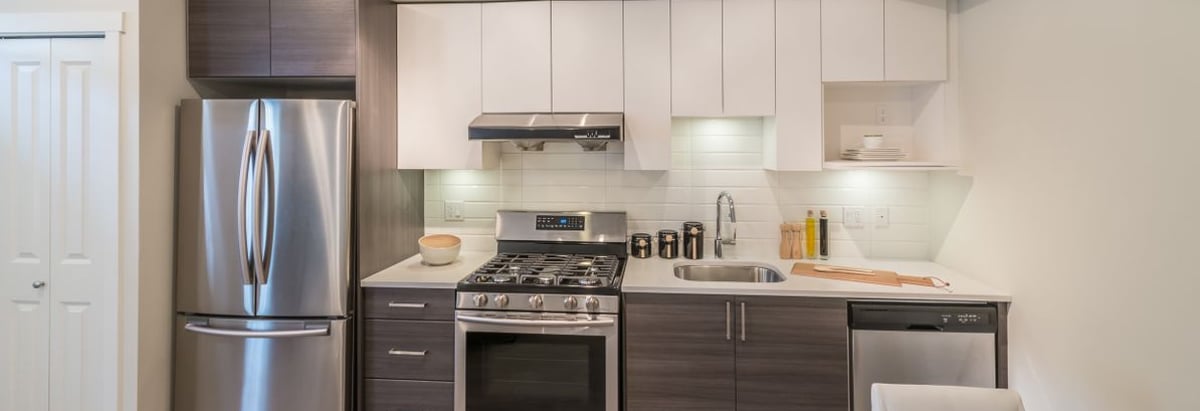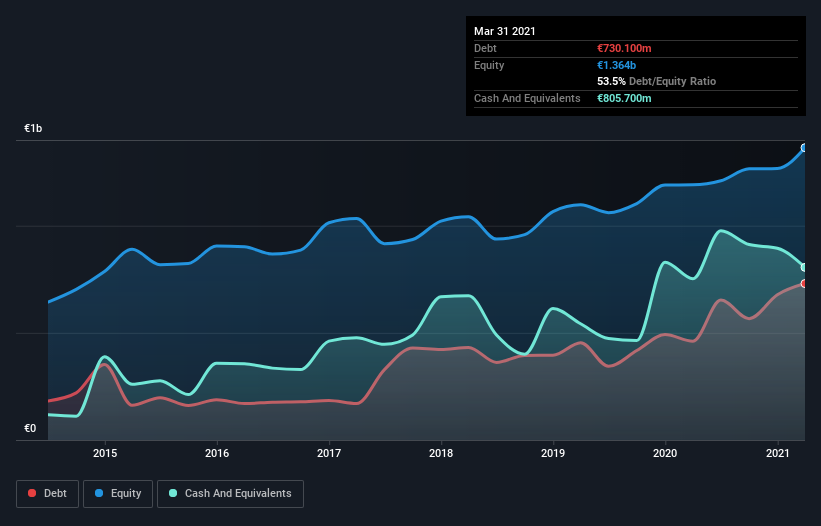- Italy
- /
- Consumer Durables
- /
- BIT:DLG
These 4 Measures Indicate That De'Longhi (BIT:DLG) Is Using Debt Safely

Some say volatility, rather than debt, is the best way to think about risk as an investor, but Warren Buffett famously said that 'Volatility is far from synonymous with risk.' It's only natural to consider a company's balance sheet when you examine how risky it is, since debt is often involved when a business collapses. We note that De'Longhi S.p.A. (BIT:DLG) does have debt on its balance sheet. But should shareholders be worried about its use of debt?
When Is Debt A Problem?
Debt assists a business until the business has trouble paying it off, either with new capital or with free cash flow. Ultimately, if the company can't fulfill its legal obligations to repay debt, shareholders could walk away with nothing. However, a more usual (but still expensive) situation is where a company must dilute shareholders at a cheap share price simply to get debt under control. Of course, the upside of debt is that it often represents cheap capital, especially when it replaces dilution in a company with the ability to reinvest at high rates of return. When we examine debt levels, we first consider both cash and debt levels, together.
See our latest analysis for De'Longhi
What Is De'Longhi's Debt?
You can click the graphic below for the historical numbers, but it shows that as of March 2021 De'Longhi had €711.9m of debt, an increase on €461.2m, over one year. But on the other hand it also has €805.7m in cash, leading to a €93.8m net cash position.

How Healthy Is De'Longhi's Balance Sheet?
Zooming in on the latest balance sheet data, we can see that De'Longhi had liabilities of €1.01b due within 12 months and liabilities of €658.4m due beyond that. Offsetting these obligations, it had cash of €805.7m as well as receivables valued at €549.7m due within 12 months. So it has liabilities totalling €315.2m more than its cash and near-term receivables, combined.
Given De'Longhi has a market capitalization of €5.59b, it's hard to believe these liabilities pose much threat. But there are sufficient liabilities that we would certainly recommend shareholders continue to monitor the balance sheet, going forward. Despite its noteworthy liabilities, De'Longhi boasts net cash, so it's fair to say it does not have a heavy debt load!
In addition to that, we're happy to report that De'Longhi has boosted its EBIT by 69%, thus reducing the spectre of future debt repayments. There's no doubt that we learn most about debt from the balance sheet. But ultimately the future profitability of the business will decide if De'Longhi can strengthen its balance sheet over time. So if you're focused on the future you can check out this free report showing analyst profit forecasts.
Finally, a company can only pay off debt with cold hard cash, not accounting profits. While De'Longhi has net cash on its balance sheet, it's still worth taking a look at its ability to convert earnings before interest and tax (EBIT) to free cash flow, to help us understand how quickly it is building (or eroding) that cash balance. During the last three years, De'Longhi generated free cash flow amounting to a very robust 95% of its EBIT, more than we'd expect. That puts it in a very strong position to pay down debt.
Summing up
While it is always sensible to look at a company's total liabilities, it is very reassuring that De'Longhi has €93.8m in net cash. The cherry on top was that in converted 95% of that EBIT to free cash flow, bringing in €412m. So we don't think De'Longhi's use of debt is risky. The balance sheet is clearly the area to focus on when you are analysing debt. However, not all investment risk resides within the balance sheet - far from it. For example - De'Longhi has 2 warning signs we think you should be aware of.
At the end of the day, it's often better to focus on companies that are free from net debt. You can access our special list of such companies (all with a track record of profit growth). It's free.
If you’re looking to trade De'Longhi, open an account with the lowest-cost* platform trusted by professionals, Interactive Brokers. Their clients from over 200 countries and territories trade stocks, options, futures, forex, bonds and funds worldwide from a single integrated account. Promoted
If you're looking to trade De'Longhi, open an account with the lowest-cost platform trusted by professionals, Interactive Brokers.
With clients in over 200 countries and territories, and access to 160 markets, IBKR lets you trade stocks, options, futures, forex, bonds and funds from a single integrated account.
Enjoy no hidden fees, no account minimums, and FX conversion rates as low as 0.03%, far better than what most brokers offer.
Sponsored ContentNew: Manage All Your Stock Portfolios in One Place
We've created the ultimate portfolio companion for stock investors, and it's free.
• Connect an unlimited number of Portfolios and see your total in one currency
• Be alerted to new Warning Signs or Risks via email or mobile
• Track the Fair Value of your stocks
This article by Simply Wall St is general in nature. It does not constitute a recommendation to buy or sell any stock, and does not take account of your objectives, or your financial situation. We aim to bring you long-term focused analysis driven by fundamental data. Note that our analysis may not factor in the latest price-sensitive company announcements or qualitative material. Simply Wall St has no position in any stocks mentioned.
*Interactive Brokers Rated Lowest Cost Broker by StockBrokers.com Annual Online Review 2020
Have feedback on this article? Concerned about the content? Get in touch with us directly. Alternatively, email editorial-team (at) simplywallst.com.
About BIT:DLG
De'Longhi
Produces and distributes coffee machines, food preparation and cooking machines, air conditioning and heating, domestic cleaning and ironing, and home care products.
Flawless balance sheet with solid track record and pays a dividend.
Similar Companies
Market Insights
Community Narratives



